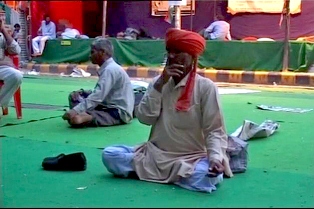
New Delhi, July 26: The euphoria and massive crowds of Ramlila Maidan are missing as social activist Anna Hazare's associates sit on another indefinite fast at Jantar Mantar, the heart of New Delhi, demanding investigation against 14 Cabinet Ministers including Prime Minister Manmohan Singh and President Pranab Mukherjee.
As Team Anna's indefinite fast at Jantar Mantar entered the second day on on Thursday, the turnout was very low with only around 500 people, most of whom were volunteers and belonged to social groups. But organisers expressed hope that the numbers will rise during the day. The India Against Corruption members have been claiming that more than 4000 people have come to Jantar Mantar to support their cause.
The response to the fast on the first day on Wednesdday was also modest with police estimating that 2,500-3,000 people attended during peak hours. The team's earlier protests had attracted several hundred people. The fast at New Delhi's Ramlila Maidan in August 2011 was attended by thousands of people and similar support was seen in all the major cities of the country, forcing the government to call a special session of Parliament to discuss Team Anna's demands.
Hazare and his associates have ben trying to raise the pitch against the Central Government. Anna Hazare on Thursday said that the government had betrayed his team and the country on several occasions. "If we go back two steps, it is not a mistake. Government betrayed us many a times. We are not asking anything for ourselves. As long as these people (central ministers) are there, Lokpal Bill will not be passed."
Arvind Kejriwal, one of the three Team Anna members who is fasting, left for Bulandshahr in Uttar Pradesh to attend a court hearing on his remarks against MPs calling them "criminals and rapists". He will join the protesters later in the day.
Before leaving for the court, Kejriwal said if such people will sit in Parliament then there is no future for the country.
"I don't think I have done anything wrong. And if speaking truth is against the country, then I am ready to face the consequences," he said.
Anna Hazare arrived at the dais only at 11 am.
Team Anna launched the agitation on Wednesday against UPA on corruption issue with activists attacking new President Pranab Mukherjee though Hazare refrained from making any personal remarks.
Hazare stuck to his pet theme of bringing a strong Lokpal Bill and threatened a 'jail bharo' agitation if government does not concede to his demands and campaigning for candidates chosen by people in the next Lok Sabha elections.





Comments
Add new comment